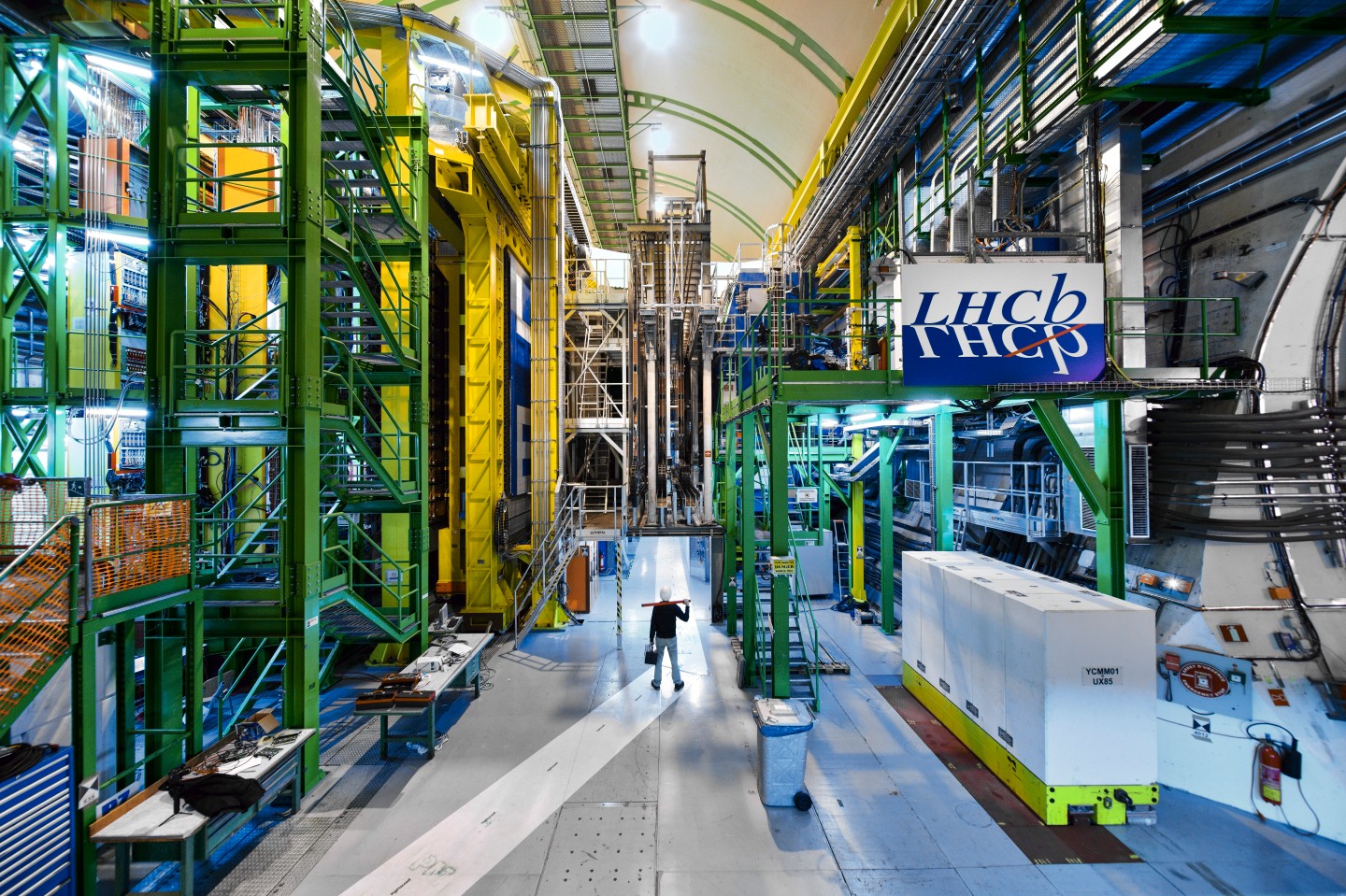The LHCb Collaboration at CERN has found particles not behaving the way they should according to the guiding theory of particle physics – the Standard Model.
The Standard Model of particle physics predicts that particles called beauty quarks, which are measured in the LHCb experiment, should decay into either muons or electrons in equal measure. However, the new result suggests that this may not be happening, which could point to the existence of new particles or interactions not explained by the Standard Model.
Physicists from the Universities of Bristol and Cambridge and Imperial College London led the analysis of the data to produce this result, with funding from the Science and Technology Facilities Council. The result was announced today at the Moriond Electroweak Physics conference.
The Standard Model is the current best theory of particle physics, describing all the known fundamental particles that make up our Universe and the forces that they interact with. However, the Standard Model cannot explain some of the deepest mysteries in modern physics, including what dark matter is made of and the imbalance of matter and antimatter in the Universe.
Researchers have therefore been searching for particles behaving in different ways than would be expected in the Standard Model, to help explain some of these mysteries.
Dr Konstantinos Petridis of the University of Bristol’s School of Physics was one of the leading physicists behind the measurement. He announced the results at a seminar organised by the European Council for Nuclear Research.
He said: “This has been a seven-year saga. Over this period, we have been seeing clues of a new unexplained process at work, but the effects were too subtle to draw any conclusions. The latest result from LHCb however offers for the first-time evidence that there could be something wrong with our current understanding of particle physics.
“We are very excited about this result but remain cautious as well. PhD students in the Bristol particle physics group are leading the studies required to confirm or refute these exciting results.
“The discovery of a new force in nature is the holy grail of particle physics. Our current understanding of the constituents of the Universe falls remarkably short – we do not know what 95 percent of the Universe is made of or why there is such a large imbalance between matter and anti-matter.”
Today’s results were produced by the LHCb experiment, one of four huge particle detectors at CERN’s Large Hadron Collider (LHC).
The LHC is the world’s largest and most powerful particle collider – it accelerates subatomic particles to almost the speed of light, before smashing them into each other. These collisions produce a burst of new particles, which physicists then record and study in order to better understand the basic building blocks of nature.
The updated measurement questions the laws of nature that treat electrons and their heavier cousins, muons, identically, except for small differences due to their different masses.
According to the Standard Model, muons and electrons interact with all forces in the same way, so beauty quarks created at LHCb should decay into muons just as often as they do to electrons.
But these new measurements suggest the decays could be happening at different rates, which could suggest never-before-seen particles tipped the scales in favour of electrons.
In particle physics, the gold standard for discovery is five standard deviations – which means there is a 1 in 3.5 million chance of the result being a fluke. This result is three deviations – meaning there is still a 1 in 1000 chance that the measurement is a statistical coincidence. It is therefore too soon to make any firm conclusions.
Professor Jonas Rademacker, team leader of Bristol’s LHCb group, added: “The search for physics beyond the Standard Model is what motivates most of us in the particle physics community. Have we finally seen the first glimpse of this “new physics”? It is too early to tell, but these results are promising.
“This could eventually lead to the resolution of fundamental questions regarding how the universe came into being, what the mysterious dark matter is, and many more. If confirmed, this would be truly revolutionary. The vast new datasets of the upgraded LHCb experiment, which will start data taking next year, will bring more clarity. This is the result of an immense collective effort by the LHCb collaboration and CERN. I’m delighted that this analysis was co-led by a Bristol academic.”
LHCb spokesperson Professor Chris Parkes from the University of Manchester and CERN, added: “If a violation of lepton flavour universality were to be confirmed, it would require a new physical process, such as the existence of new fundamental particles or interactions.
“More studies on related processes are under way using the existing LHCb data. We will be excited to see if they strengthen the intriguing hints in the current results.”
The deviation presented today is consistent with a pattern of anomalies measured in similar processes by LHCb and other experiments worldwide over the past decade.
The new results determine the ratio between the decay probabilities with greater precision than previous measurements and use all the data collected by the LHCb detector so far for the first time.
This result is three deviations from the Standard Model – meaning there is still a 1 in 1000 chance that the measurement is a statistical coincidence.
STFC Executive Chair Professor Mark Thomson said: “This tantalising hint for new and unexplained physics demonstrates the importance of the LHC in exploring nature at its most fundamental level.”
It is now for the LHCb collaboration to further verify their results by collating and analysing more data, to see if the evidence for some new phenomena remains. The LHCb experiment is expected to start collecting new data next year following an upgrade to the detector.
